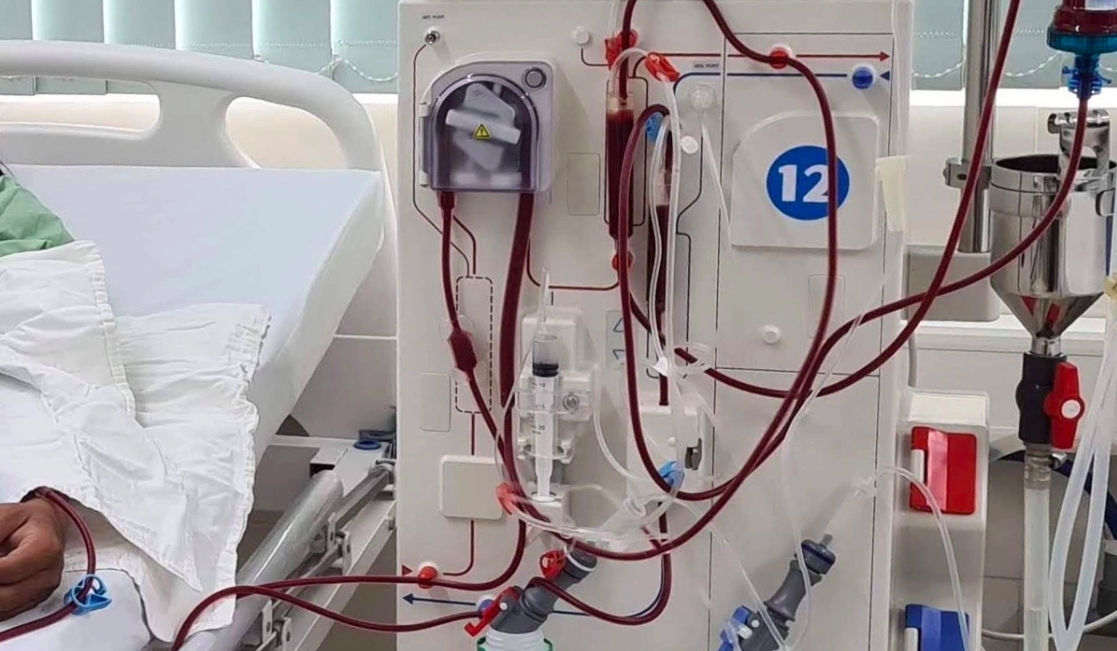Earlier this year, 66-year-old Hung from Thanh Hoa and his wife became worried after his routine health checkup revealed high blood lipid levels. Despite receiving medication and lifestyle advice from their doctor, the fear of heart attack and stroke continued to haunt them.
Hung's wife searched online for information about lowering blood lipids and found several medical facilities advertising "blood filtering to prevent stroke" and "removing bad cholesterol and toxins from the blood." These facilities emphasized that "high blood lipids are a shortcut to stroke," increasing her anxiety.
The couple decided to fly to Ho Chi Minh City for blood filtering. They were told blood would be drawn from the right arm artery, passed through two specialized filters to remove blood lipids, toxins, and triglycerides, and then returned to the left arm vein. With a cost of over 100 million VND per person per session and a promise of "clean blood" and disease prevention, they opted for the procedure.
"A few months later, at my next routine checkup, my blood lipid levels were still high. This time, the doctor insisted on following the prescribed medication, along with a healthy diet and exercise," Hung's wife said, lamenting the wasted money.
The couple's story is not unique. With nearly half of Vietnam's adult population suffering from lipid disorders, according to the National Institute of Nutrition, advertisements for "high-tech blood filtering" exploit people's fear of illness. Many families have spent hundreds of millions of VND, even traveling to Singapore or Japan, pursuing this scientifically unfounded treatment.
 |
A patient undergoing blood filtering at a hospital in Ho Chi Minh City. Photo: Le Phuong |
A patient undergoing blood filtering at a hospital in Ho Chi Minh City. Photo: Le Phuong
On 5/9, Dr. Truong Quy Kien, Deputy Head of the Department of Nephrology and Dialysis at the 108 Military Central Hospital, explained that dialysis uses an artificial filter or the peritoneum to remove certain substances from the blood. This technique is indicated for genuine medical conditions like end-stage renal disease, acute kidney injury unresponsive to treatment, acute liver failure, septic shock, acute pancreatitis, some severe autoimmune diseases, or hereditary lipid disorders. Dr. Kien emphasized that dialysis should only be prescribed by a specialist and performed in medical facilities with proper infection control, equipment, and emergency medication.
Dialysis is a treatment for disease, not a preventative measure. Blood lipids, commonly known as "blood fat," are a component of blood plasma, produced daily along with other components. Therefore, no method can completely filter them out, Dr. Kien added.
Many experts and doctors have warned against this expensive service. In mid-March, the Ho Chi Minh City Department of Health stated that there is insufficient medical evidence or legal basis for using blood filtering or plasma exchange to prevent high blood lipids, stroke, or remove toxins in healthy individuals. Director Tang Chi Thuong said this conclusion followed a meeting with leading experts in dialysis, nephrology, intensive care, and representatives from hospitals that perform blood and plasma filtering. The conclusion was based on scientific evidence analysis.
Associate Professor Dr. Nguyen Lan Hieu also believes that advertisements for "high-tech blood filtering" to prevent cancer and stroke are merely ploys exploiting people's gullibility, posing serious health risks. Dr. Nguyen Van Thanh from the Department of General Internal Medicine at Hanoi Medical University warned that excessive dialysis can lead to dangerous complications like hypotension, chest pain, back pain, cramps, fever, anaphylactic shock, blood loss due to bleeding, arrhythmia and cardiac arrest, embolism due to air entering the circulatory system, stroke during and after dialysis, and bloodstream infections.
Experts warn that stroke is caused by multiple factors, not just lipid disorders. Managing blood lipids, controlling other cardiovascular risk factors (hypertension, obesity, etc.), and following a healthy diet and lifestyle can help prevent stroke. According to Dr. Kien, for individuals with familial lipid disorders for whom medical management is ineffective, double filtration adsorption may be beneficial in some cases.
"People should carefully consider treatment options and seek guidance from specialists. Be wary of exaggerated claims about effectiveness," Dr. Kien said, advising regular checkups for early detection of disorders and consultation with qualified doctors.
Le Nga












